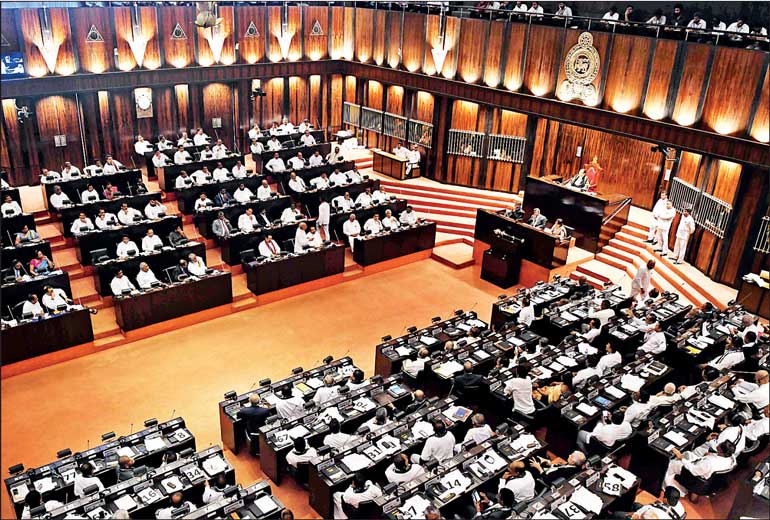Wednesday Feb 18, 2026
Wednesday Feb 18, 2026
Friday, 11 November 2022 00:30 - - {{hitsCtrl.values.hits}}

How could a society in which the supreme law of the country has been continuously violated since independence with no strong protest of the educated and the intellectuals, be considered as a society with a healthy state of mind?
 What is the root cause of the great collapse, failure and bankruptcy of Sri Lanka? The most popular belief has been that it was due to corruption of politicians and the bureaucracy. Dr. Rohan Pethiyagoda, one of Sri Lanka’s foremost biodiversity experts in his recent speech at the convocation of the Sri Jayewardenepura University, stated that the actions initiated by the Government disregarding common sense is the root cause of the present crisis facing the country.
What is the root cause of the great collapse, failure and bankruptcy of Sri Lanka? The most popular belief has been that it was due to corruption of politicians and the bureaucracy. Dr. Rohan Pethiyagoda, one of Sri Lanka’s foremost biodiversity experts in his recent speech at the convocation of the Sri Jayewardenepura University, stated that the actions initiated by the Government disregarding common sense is the root cause of the present crisis facing the country.
Printing money in enormous amounts as much as Rs. 2.3 billion in paper by the Central Bank to overcome the balance of payments crisis, change of the agriculture policy overnight and switching from the use of chemical fertilisers to organic fertilisers, promoting Dhammika Paniya as a cure for the COVID-19 pandemic, are three examples cited to show the actions taken disregarding common sense or rather ignoring scientific considerations. There is a great deal of truth in what Dr. Rohan Pethiyagoda says. But acting without common sense or disregarding science is not something that has fallen all of a sudden from the sky during the regime of Gotabaya; and it can be considered as a weird situation that has been developing in the country over a long time.
Domination of ignorance
The ideology that a better harvest could be obtained by using organic fertilisers and applying traditional pest control methods was a dogma that was being propagated by some ideological movement for a long time (since early nineties). The agronomists have rarely criticised the ideas of this ideological movement as there was a widespread tendency or policy towards branding them as those depending on multinational fertiliser mafia. After the Yahapalana Government came to power, the Government offered a grant of money to a Buddhist priest who supported this ideology for a project to popularise organic farming. The amount spent and funds allocated for it were enormous.
President Gotabaya switched the whole country overnight to organic farming causing a great deal of destruction to agriculture only as the implementation of an advance phase of the stupid and destructive program that was in operation until then. Even the huge promotion in the sphere of superstitious beliefs was not a sudden occurrence during the regime of President Gotabaya, but an outcome of a process that had been developing for a long time. Myth was becoming socialised on a large scale in an atmosphere where even those who represent modern science too, used to keep quiet and refrain from acting against mythical beliefs and practices.
The school system of the country also acted as an institutional system that promoted myth instead of scientific approaches. Accompanying students sitting for examinations to religious shrines to invoke blessings of supernatural powers and making vows had become a part of official duties of school teachers with the patronage of the Principal. The television channels of the country not only made the people aware of the inauspicious times of the day which were considered not favourable to commence any good deed but also to indicate the direction at which the Rahu or Maru stays.
A former commissioner of examinations went to the extent of even changing the scheduled date of commencing the GCE OL examination from Monday to Tuesday apparently to save the candidates from the influence of Rahu or the inauspicious time. The education authorities did not prevent his stupid act. It did not cause opposition from scientists or teachers either. In view of the above it is not difficult to understand that not only those who have imbibed in myth but also those versed in science too, have contributed to promote this unfortunate situation in Sri Lanka.
I am of the view that the people of Sri Lanka in general and the Sinhalese Buddhist people in particular have a peculiar mental disposition which prevents them understanding or grasping some realities in their correct perspective. Lack of integrity is another characteristic inherent with this mental disposition. The Sinhalese are generally inclined to think that their ethnic group is the highest or the best of all ethnic groups in the world. At the same time, they tend to look down upon the people who are not from the Govigama caste despite the fact that the latter constitutes about half of the population of their ethnic group. It is also a feature found in Tamil society as well.
It can be said that this peculiar mental disposition characterised by such discriminatory elements which has overwhelmed the Sri Lankan society can be said to have impacted as a major factor for the collapse, failure or bankruptcy of the country. As no comprehensive study has been made on this aspect so far, all I could do is present some useful examples to help understand this nature. The examples I wish to present are as follows.
Anagarika Dharmapala
After the Sinhalese society became a literate entity, it was the European civil servants who served in Sri Lanka that discovered and educated the former, of its past history. The European civil servants such as John Doyle, Alexander Johnston, R.C. Wilders, H.W. Codrington, Hugh Neville, Rhys Davies, Thomas Steele and H.C.P. Bell who had engaged themselves in historical, archaeological, religious and literary research in connection with the ancient kingdoms of Anuradhapura and Polonnaruwa and had revealed the glory of the ancient civilisations of Sri Lanka, particularly the advancement that prevailed at that time, about their arts and crafts, irrigation systems, temples and monumental Dagabas, etc. They were the pioneers who published valuable books on the past civilisation of the country.
Some local scholars have misconstrued the facts disclosed by the European officials regarding the history of Sri Lanka. Anagarika Dharmapala, who can be considered as the foremost thinker of the Sinhalese people, could be cited as the best example of this. It was he who transmitted the essence of the books written in English by European civil servants, about the glamour of ancient Sri Lanka, to the Sinhala Buddhist people. Sri Lanka undoubtedly had an advanced civilisation that can be praised. But it was not one of the greatest civilisations in the world.
However, Dharmapala interpreted the Sinhala Buddhist civilisation of Sri Lanka disclosed in the books written by the European civil servants as being the best and the noblest of all civilisations that existed in the world thereby prompting the Sinhala Buddhist people of Sri Lanka to believe that they were the noblest and the most exclusive ethnic group in the world. B.H. Farmer has made an intensive analysis on how the Mahavamsa, the great chronicle, has influenced Sinhala people to believe that Sri Lanka, Sinhala race and Buddhism are superior and nobler than all other countries, religions and ethnic groups in the world.
Dharmapala’s influence has been even greater. He created an atmosphere conducive for Sinhala Buddhist ethno religious groups to believe that the Sinhala Buddhist civilisation in Sri Lanka might be the greatest civilisation in the world. This reflects that Dharmapala did not have a comparative knowledge or understanding of world civilisations. But how can we explain this to Sinhala Buddhist scholars living in the 21st century, who are adhered to such extreme views. The arrogant attitude that we are the greatest nation in the world has led to confusion in the affairs of the country and caused a great deal of conflicts and bloodshed. Today, it is ironic that the country which regarded itself as the greatest of all and its people are sadly caught up in a state of extreme poverty, failure and bankruptcy.
Violation of constitution
I think my second illustration will help understand better the peculiar mental disposition described above. It is as follows: The democratic systems of governance based on written constitutions which accept the sovereignty of the people began to arise parallel to the collapse of the feudal monarchical system and the emergence of modern nation-states. It is more than 200 years since this process began. The states that adopted this system considered the Constitution as the supreme law of the country, which is above all other laws. Democratic States while defending the Constitution held it in utmost respect. Violation of the Constitution was considered a serious offense and a policy was adopted that any violation of it for whatever reason would be rectified subsequently.
The violation of the Constitution by President Roosevelt of America was rectified by the 22nd amendment adopted in 1952. Similarly the violation of the Constitution by the 42nd amendment adopted in 1976 during the Indira Gandhi regime in India was rectified by the 43rd and 44th amendments adopted in 1978. Surprisingly, since independence, Sri Lanka has followed a policy of violating the Constitution from time to time like a State that remains outside the culture of political civility. D.S. Senanayake, S.W.R.D. Bandaranaike and Sirima Bandaranaike violated the Constitution.
After the establishment of a presidential system of governance in ‘78, the violation of the Constitution became a large-scale exercise and some violations took place as a collusive exercise of the legislature, executive and the judiciary. Sri Lanka is in a weird situation in the world when it comes to constitution violations. Except in the case of Shirani Bandaranaike, there have been no strong protest movements by intellectuals or public against constitution violations. Even the Bar Association has not followed a consistent policy against the violations of the Constitution except in the case of the removal of Chief Justice Dr. Shirani Bandaranayke in contravention of international standards on judicial independence.
How could a society in which the supreme law of the country has been continuously violated since independence with no strong protest of the educated and the intellectuals, be considered as a society with a healthy state of mind? Also, how could such a State be considered a civilised state? Under the circumstances, how could we be surprised at the terrible collapse that has now befallen that state?